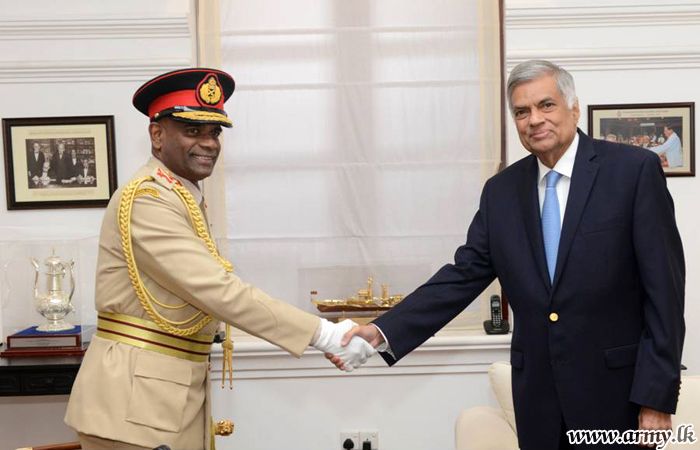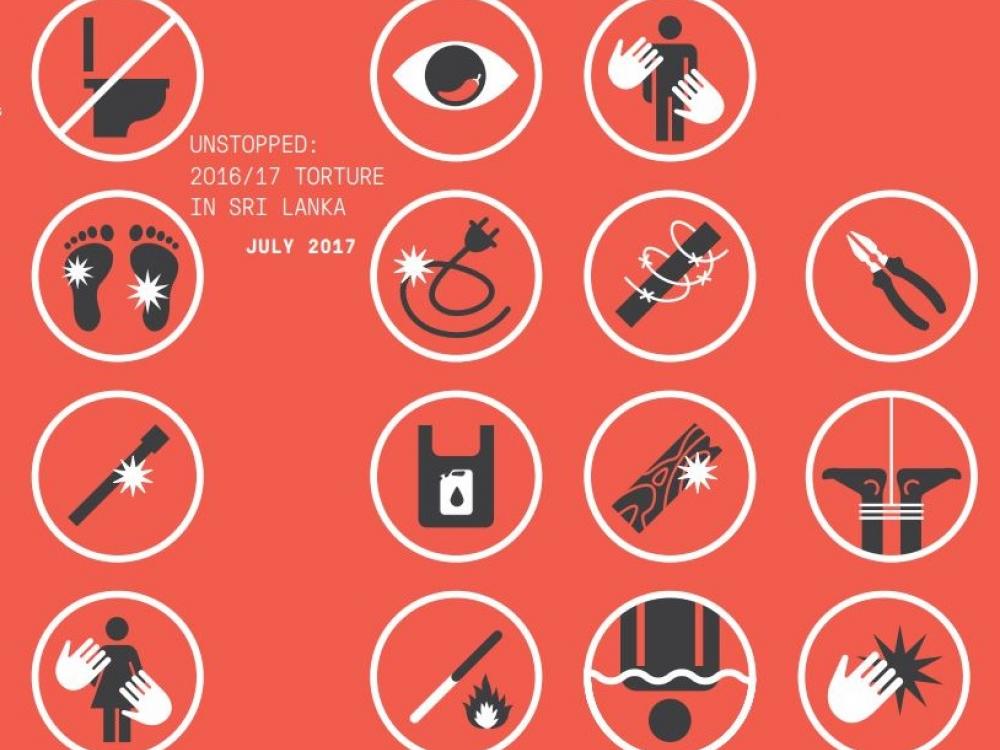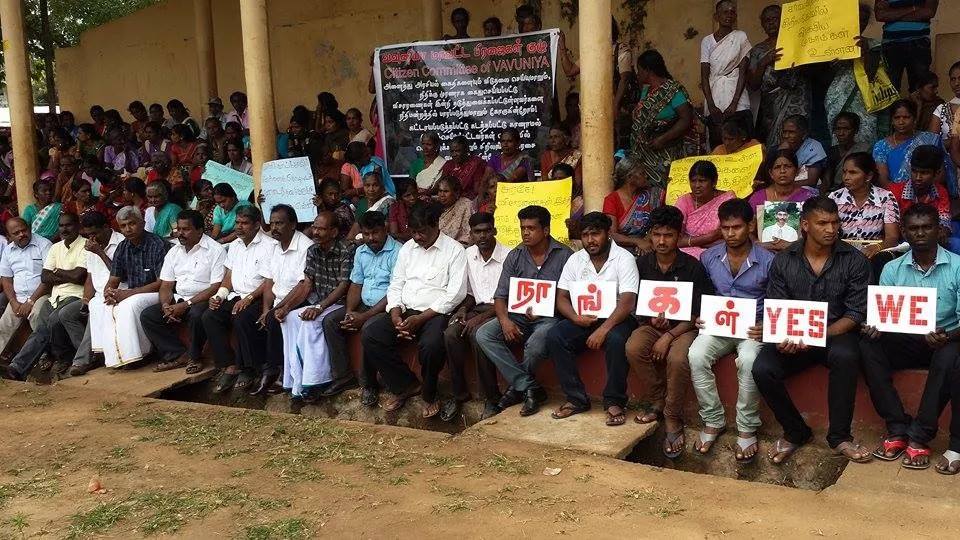| Photograph: Sunday Times |
The Sri Lankan government has done “almost nothing” to hold human rights violators in the military to account said Ben Emmerson, the United Nations Special Rapporteur on human rights and counter-terrorism on Friday, warning it was laying down conditions that may “reignite conflict”.
In a press release at the end of a five-day visit to the island, Mr Emmerson criticised the Sri Lankan government for its failure to implement a UN Human Rights Council resolution that it co-sponsored in 2015 and was quoted by Reuters as saying, 'Sri Lanka could face a range of measures, including a referral to the UN Security Council, if it fails to meet commitments it made under a 2015 UN resolution.'
“The Government has thus far done almost nothing to hold to account those members of the armed forces and security services who committed gross human rights violations during and since the conflict,” he stated.
“At the same time, it has, until now, continued to operate the cruel and unjust [Prevention of Terrorism Act] system,” added Mr Emmerson, noting that it is “a system that has overwhelmingly impacted on the Tamil minority”.
“These are precisely the conditions likely to produce festering grievances, to foster unrest and even to reignite conflict,” concluded the Special Rapporteur.
A ‘virtual halt’ on accountability
In his wide-ranging press release, Mr Emmerson spoke on issues of accountability, torture and anti-terror legislation on the island.
“None of the measures so far adopted to fulfil Sri Lanka’s transitional justice commitments are adequate to ensure real progress, and there is little evidence that perpetrators of war crimes committed by members of the Sri Lankan armed forces are being brought to justice,” he said.
Progress “seems to have ground to a virtual halt,” he told reporters in Colombo. “There is little evidence that perpetrators of war crimes committed by members of the Sri Lankan armed forces are being brought to justice.”
During his visit, he met with the Sri Lankan Prime Minister Ranil Wickremesinghe, who gave Mr Emmerson “a personal assurance” that a Truth and Reconciliation Commission and Special Prosecutor would be set up to prosecute for atrocities. “These are, of course, steps which the Government promised to the international community that it would have delivered in full by now,” noted the Special Rapporteur.
 |
| Sri Lankan Prime Minister Ranil Wickremesinghe meeting with the new commander of the Sri Lankan army this week. There is "little evidence" that members of the military are being brought to justice for war crimes, said the Special Rapporteur. |
Though he welcomed the arrest of a senior Sri Lankan Naval Commander, who was arrested this week for his alleged involvement in the disappearance of 11 Tamil youths, Mr Emmerson stated that,
“But these indications fall far short of Sri Lanka’s international commitment to achieve a lasting and just solution to its underlying problems, for the benefit of all of its communities, to establish a meaningful system of transitional justice that is governed by the principles of equality and accountability, and to put in place essential and urgently needed reform of the security sector”.
Torture – endemic, systematic, routine
 Mr Emmerson went on to slam the island’s Prevention of Terrorism Act, stating it was a “deeply flawed” piece of legislation.
Mr Emmerson went on to slam the island’s Prevention of Terrorism Act, stating it was a “deeply flawed” piece of legislation.
“The use of torture has been, and remains today, endemic and routine, for those arrested and detained on national security grounds,” added Mr Emmerson’s preliminary findings. “Since the authorities use this legislation disproportionately against members of the Tamil community, it is this community that has borne the brunt of the state’s well-oiled torture apparatus.”
Mr Emmerson met with Tamil political prisoners being held at Anuradhapura prison and was told of “distressing stories of extremely brutal methods of torture”.
The torture included beatings with sticks, the use of stress positions, asphyxiation using plastic bags drenched in kerosene, the extraction of fingernails, the use of water torture, the suspension of individuals for several hours by their thumbs and the mutilation of genitals, he said.
His findings come as the International Truth and Justice Project’s (ITJP) latest report found the torture and rape of Tamils in Sri Lanka has continued into 2017.
“Despite the shocking prevalence of the practice of torture in Sri Lanka” there remained a “lack of effective investigations into such allegations” he stated.
Safeguards that the Sri Lankan government has claimed are in place “have proved entirely insufficient to protect suspects against this most cowardly of international crimes,” he continued.
‘Painfully slow’
Mr Emmerson went on to call the “entire PTA system… a flagrant denial of justice”.
“On requesting official figures for those currently charged with offences under the PTA, he was given statistics from which it is apparent that out of 81 prisoners currently in the judicial phase of their pre-trial detention, 70 had been in detention without trial for over five years and 12 had been in detention without trial for over 10 years,” said his preliminary findings.
“These staggering figures are a stain on Sri Lanka’s international reputation.”
 |
| Tamils protest in Vavuniya in 2015, calling for the release of their detained relatives from state custody. See more here. |
Though the Sri Lankan government committed to repealing the PTA in a UN Human Rights Council resolution, progress has been “painfully slow” and this has, in turn, “delayed the wider package of transitional justice measures that Sri Lanka committed to deliver two years ago,” he said.
A new Counter Terrorism Act has been proposed by Sri Lanka, but the Special Rapporteur said “there are a number of central flaws in the current framework draft which, if enacted, would guarantee the continued violation of the human rights of terrorism suspects”.
“When the two sides of the accountability equation are viewed side by side, the resulting picture is stark,” he concluded.
“The Government has thus far done almost nothing to hold to account those members of the armed forces and security services who committed gross human rights violations during and since the conflict. At the same time, it has, until now, continued to operate the cruel and unjust PTA system, a system that has overwhelmingly impacted on the Tamil minority.”
“These are precisely the conditions likely to produce festering grievances, to foster unrest and even to reignite conflict.”
See the full text of his findings here.
